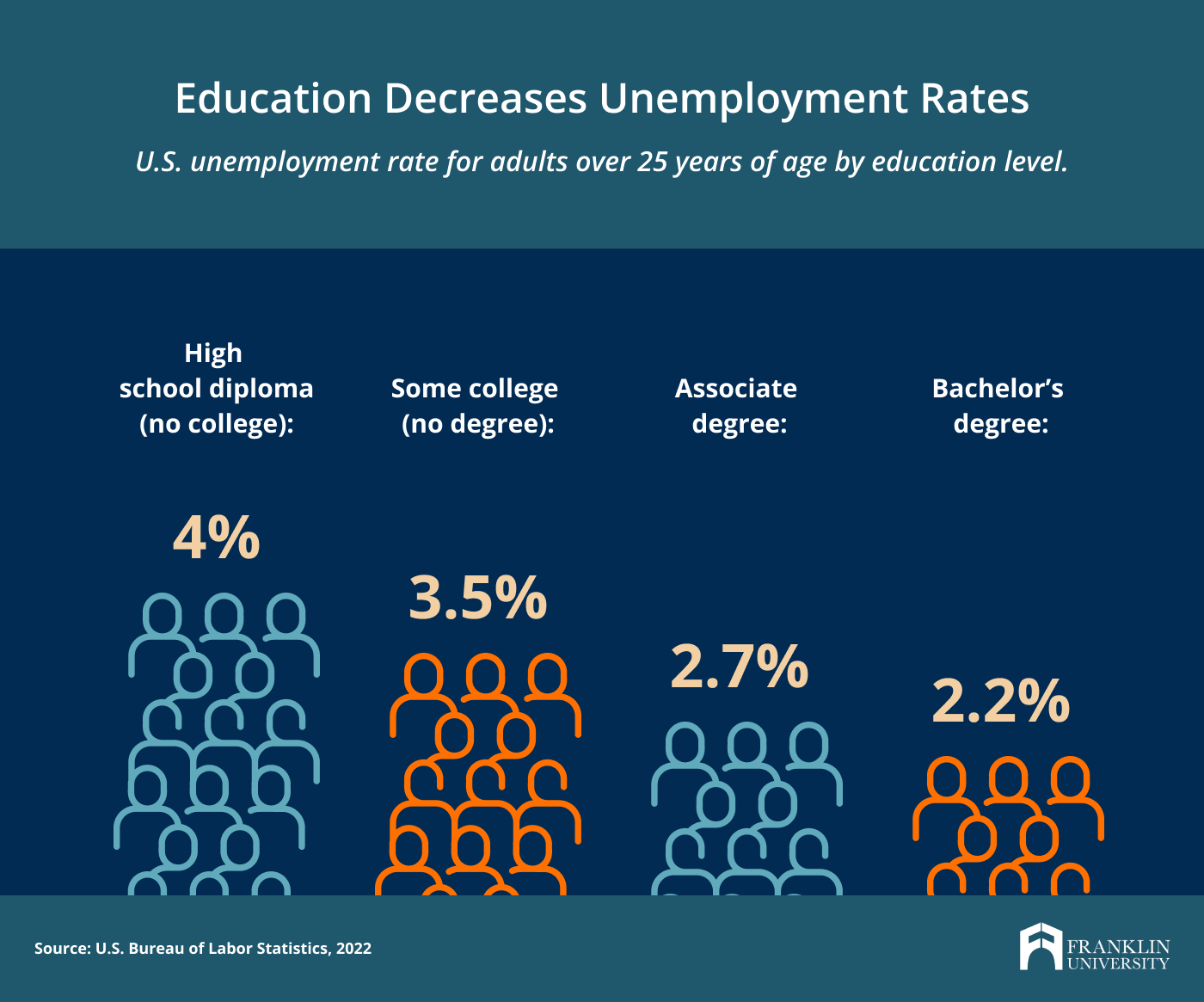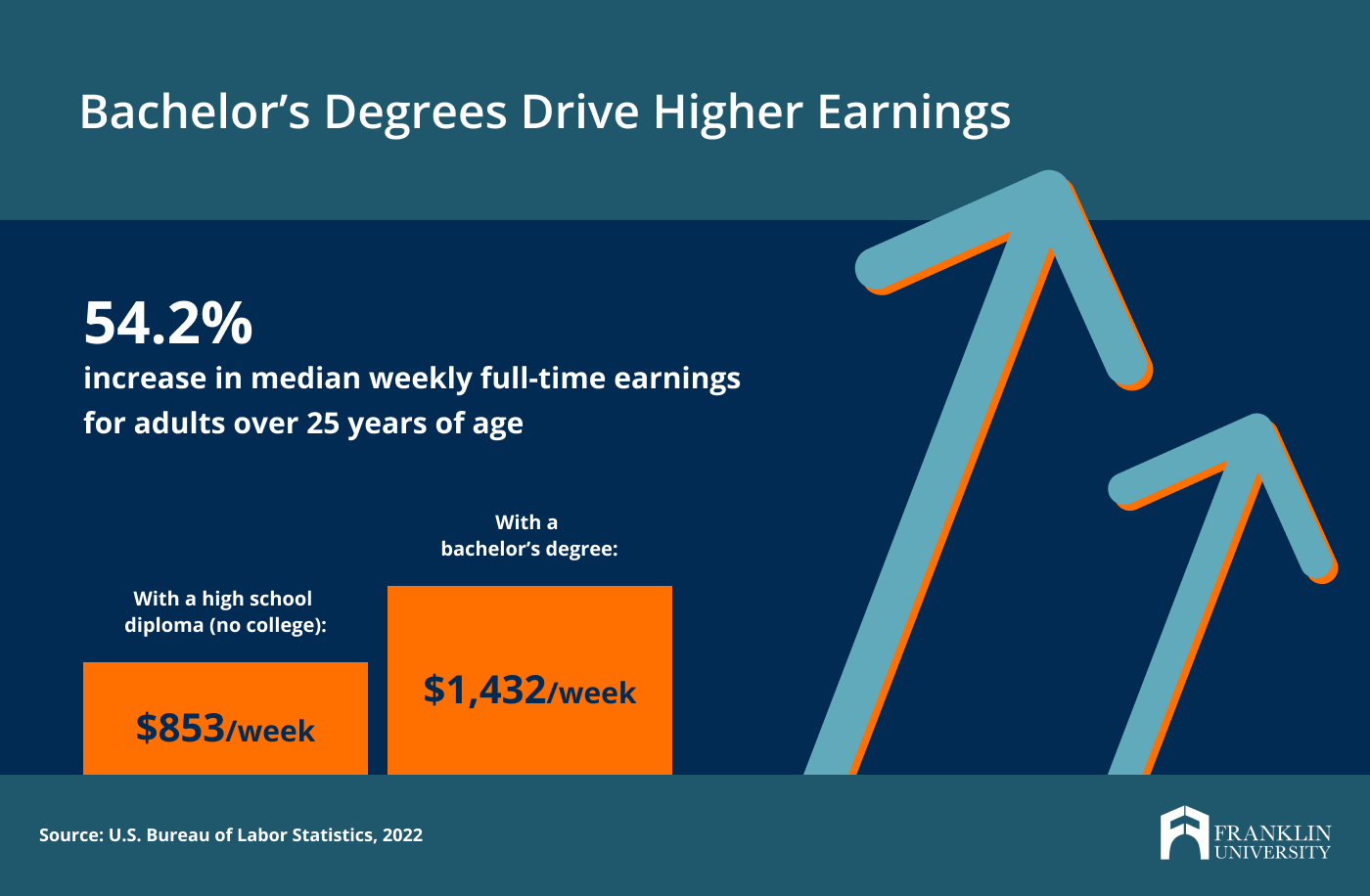Request Information
We're Sorry
There was an unexpected error with the form (your web browser was unable to retrieve some required data from our servers). This kind of error may occur if you have temporarily lost your internet connection. If you're able to verify that your internet connection is stable and the error persists, the Franklin University Help Desk is available to assist you at helpdesk@franklin.edu, 614.947.6682 (local), or 1.866.435.7006 (toll free).
Just a moment while we process your submission.

Top 8 Benefits of a Bachelor’s Degree
Earning a bachelor’s degree is a big decision requiring a significant investment of time and money. If you’re trying to decide whether to pursue a college education, you probably already know that a degree can set you up to earn more – but you may not know about the other ways it can improve your life.
Dr. Kody Kuehnl, dean of Franklin University’s College of Arts, Sciences and Technology and director of STEM programs, shared eight potential benefits of a bachelor’s degree, some of which might surprise you.

1. More Job Opportunities
“For most career paths, the bachelor’s degree still represents the ticket or pass to get into the game or ride the ride,” said Kuehnl.
For many fields, a bachelor’s degree is a requirement for entry. According to Lightcast, a leading labor market analytics firm, 40.7% of job postings in January 2023 required at least a bachelor’s degree.
Even for positions that don’t formally require a degree, employers may still strongly prefer to hire people who hold one. After all, when employers receive many applicants for each position, it’s easy to narrow down the candidate pool using qualifications like education. That means that in many industries, a degree can give you a better chance of being considered for your dream role.
When it comes to paying for school, grants are among your best options. But do you know how to find them? Remove the guesswork by downloading this free guide
2. Higher Earning Potential
In 2022, the Bureau of Labor Statistics reported that among full-time workers over 25, bachelor’s degree holders took home a median salary of $1,432 each week, compared to $853 a week for professionals with a high school diploma and no college experience.
Since bachelor’s degrees open the door to many higher-paying careers, such as computer science and healthcare roles, they often offer more opportunities to move into even higher-paid roles.

3. Develop Marketable, In-Demand Skills
Some degrees don’t necessarily lead directly to jobs, which is one reason some people are skeptical about the value of college. However, that issue can be avoided entirely by seeking out schools and degree programs that focus on preparing students for rewarding careers.
Many bachelor’s programs are created with specific industries and career paths in mind, meaning that students graduate with valuable and in-demand skills. For example, Franklin University’s 30+ bachelor’s degree programs all offer both the curricula and the personalized career support students need to achieve their professional goals.
Bachelor’s programs will also help you develop in-demand “soft skills,” like communication and teamwork, that can help you stand out in the application process and thrive once you’ve landed a role.
4. Build a Strong Network
“College campuses are thought incubators which enable great interactions with peers, faculty/staff and other professionals in the field that you are hoping to enter,” said Kuehnl.
Some of that networking takes place through class discussions (in-person or online) and opportunities like conferences and workshops designed for current students. Most colleges also have an alumni network that you can tap into to get advice on different career paths or even to make connections that could lead to a job. If you attend a college like Franklin University where most faculty are actively working in their fields of expertise, your professors can also be a great source of advice and opportunities.
5. Open the Door to Advanced Degrees
Plenty of fulfilling, lucrative careers are available to professionals with only bachelor’s degrees. However, if you choose to pursue advanced study in your field or earn a professional degree like an MBA or a JD, you’ll need to hold a bachelor’s degree. Even if you don’t currently have any plans to do so, keeping the option open puts you in a better position to pivot should industry requirements, expectations or your personal goals change. For example, if you rise to a managerial role in your field, you may find that an MBA would open doors to lucrative leadership positions or consulting opportunities. In this situation, your path forward will be much simpler if you already hold a bachelor’s degree.
6. Expand Your Worldview and Perspective
In addition to field-specific coursework, most bachelor’s degrees require that students complete a number of general education credits. Even those courses that don’t seem at first glance to be specifically linked to your future industry might change how you see the world.
“Taking courses in social and behavioral sciences, arts and humanities exposes us to new ways of thinking and doing things, which can be transformative,” said Kuehnl. “They help us push back the boundaries of our own ignorance and can stimulate a deeper understanding of the world in which we live. In my opinion, the value of this personal and intellectual development rivals the value of the degree itself.”
7. Gain Lifelong Access to University Resources and Faculty
Many institutions provide alumni access to libraries, research labs, technology resources, internships and alumni networks – all of which can help you break into a new field or accelerate your career. Some schools also offer significant career support even after you graduate.
“At Franklin, our alumni have access to our Center for Career Development, which can continue to help provide guidance, career counseling and resources to prepare you for your next big opportunity,” explained Kuehnl. Those resources include coaching, résumé reviews, exclusive job fairs and networking opportunities for both students and alumni.
8. Build and Demonstrate Personal Resilience
For many employers, a college degree doesn’t just represent subject-matter expertise - it shows that you had the discipline to stick with a degree program, even when it got hard.
This is especially true of the many adult learners who earn their degrees at Franklin, said Kuehnl. “Accomplishing a bachelor’s degree requires dedication, determination, resilience, perseverance and my personal favorite – grit. There is a lot to balance and going through the process is a lot like metal going through the forging process – there is a lot of pressure, heat and discomfort, but what comes out the other side is strong and resilient.”
Learn How a Bachelor’s Degree Can Benefit You
Franklin University’s programs are primarily offered online and asynchronously, making a bachelor’s degree more accessible and affordable. Whether you’re starting a bachelor’s degree for the first time or returning to college after many years, you’ll fit right into Franklin’s diverse and welcoming student population.
Choose from a variety of programs targeted to your interests and receive hands-on support from instructors who are experts in their fields. Franklin’s curricula prioritize marketable, usable job skills, and the university’s career services extend after graduation to ensure you have the resources and help to make the most of your degree.
Find out how a degree from Franklin can change your life.





